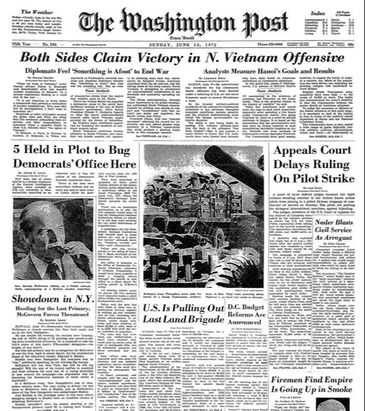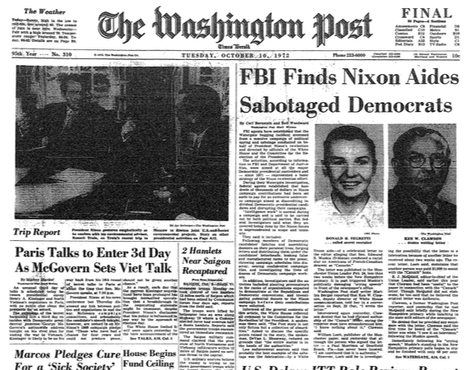The Watergate Scandal began in June 1972 when five burglars were caught attempting to bug the Democratic National Convention office. In the midst of a hostile election closely related to the Vietnam War, Nixon's Committee to Re-Elect the President believed that using aggressive tactics, or even illegal espionage such as breaking into the DNC, was the only way to ensure a win. [2]

"'5 Held in Plot to Bug Democrats’ Office Here' by Alfred E. Lewis, Washington Post staff writer, Sunday, June 18, 1972, Page A01. Contributing to this story were Washington Post staff writers Bob Woodward, Carl Bernstein, Bart Barnes, Kirk Scharfenberg, Martin Weil, Claudia Lery, Abbott Combes, and Tim O’Brien." [6]
After the break in, President Nixon insisted that he “had no prior knowledge of the Watergate operation,” [3] and he was reelected for a second term.
"On August 15, 1973, in his second address to the nation concerning the Watergate trial, President Richard Nixon denies any role in a cover-up." [7]
 "FBI Finds Nixon Aides Sabotaged Democrats
By Carl Bernstein and Bob Woodward Washington Post Staff Writers
The Washington Post, Times Herald (1959-1973); Oct 10, 1972; ProQuest Historical Newspapers The Washington Post (1877 - 1992)
pg. A1" [8]
"FBI Finds Nixon Aides Sabotaged Democrats
By Carl Bernstein and Bob Woodward Washington Post Staff Writers
The Washington Post, Times Herald (1959-1973); Oct 10, 1972; ProQuest Historical Newspapers The Washington Post (1877 - 1992)
pg. A1" [8]
Later, it was found out that Nixon gave large amounts of money to the burglars to keep them quiet about his involvement in the case. He also planned to command the FBI to stop the investigation, which many criticized as being an abuse of presidential power and obstruction of justice. Though Nixon insisted that he was not involved in the bugging of the DNC, journalists Bob Woodward and Carl Bernstein suspected that there was some larger scheme and began investigating.
In October 1973, Nixon had Archibald Cox, a well regarded lawyer and scholar, fired because he would not stop requesting the Presidential tapes. In protest, a few Justice Department officials resigned from office. Finally, in August 1974, Nixon released the tapes that proved his involvement in the crime and resigned as President. [4] However, the public was not satisfied by his decision, since his resignation meant that he escaped going to trial in the Senate. Due to this, his team
was not obligated to share all the details of the break in. There may
still be many pieces of the story that we don't know. [5]
Footnotes:
- Header Image: U.S. News Staff, "The Effects of Watergate: The Good and the Bad," U.S. News, [Page #], accessed December 13, 2016, http://www.usnews.com/news/articles/2014/08/08/effects-of-watergate-the-good-and-the-bad.
- A+E Networks, "Watergate Scandal," History.com, last modified 2009, accessed April 5, 2017, http://www.history.com/topics/watergate.
- Gerhard Peters and John T. Woolley, "Statements about the Watergate Investigations," The American Presidency Project, last modified May 22, 1973, accessed January 30, 2017, http://www.presidency.ucsb.edu/ws/?pid=3855.
- Washington Post Staff, "The Watergate Story," The Washington Post, accessed January 24, 2017, http://www.washingtonpost.com/wp-srv/politics/special/watergate/part1.html.
- Michael Hardy, "Watergate Scandal: Public Distrust of Government Begins," Federal Times, http://www.federaltimes.com/story/government/anniversary/2015/12/01/watergate-scandal-public-distrust-government-begins/76365238/.
- Academy of Achievement, "Bob Woodward," Academy of Achievement, last modified January 4, 2017, accessed February 5, 2017, http://www.achievement.org/achiever/bob-woodward/.
- A+E Networks, "Nixon Denies Watergate Allegations," History.com, accessed February 5, 2017, http://www.history.com/topics/watergate/videos/nixon-denies-watergate-allegations.
- Carl Bernstein and Bob Woodward, "FBI Finds Nixon Aides Sabotaged Democrats," The Washington Post, October 10, 1972, accessed February 5, 2017, http://www.washingtonpost.com/wp-srv/metro/pdf/101072.pdf.
